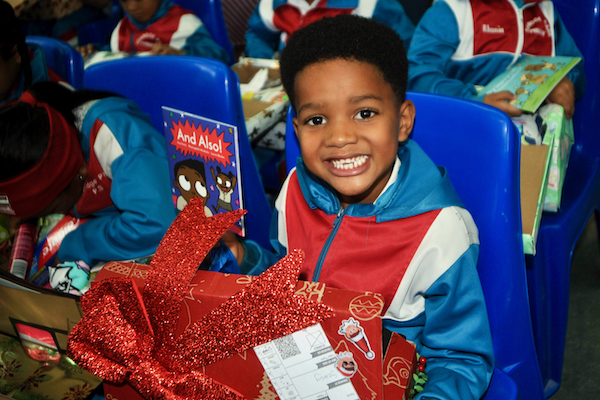A Nation That Can’t Read Can’t Succeed
Every year, thousands of children enter formal schooling without the foundational literacy skills needed for success. Research from the World Literacy Foundation shows that children who lack early literacy skills are more likely to fall behind and face long-term educational challenges. Despite government’s recognition of early childhood development (ECD) as crucial to reversing South Africa’s literacy crisis, meaningful action has admittedly been delayed by three decades.
Although the seventh administration has reaffirmed its focus on early childhood literacy, these commitments remain largely unfulfilled due to lack of funding. “Operating a compliant ECD programme costs nearly five times the per-learner subsidy, leaving many centres without sufficient resources,” explains Deb Zelezniak, CEO of the Santa Shoebox Project. “Currently, 61% of ECD centres have fewer than 10 books for children, and only 56% provide age-appropriate reading materials.”
The lack of access to books extends beyond ECD centres, with over 40% of South African households having no books at all. According to the Department of Basic Education and UNICEF South Africa, this means many children enter Grade 1 without ever having held a book.
“While the R99 million allocated over the MTEF for early grade reading initiatives is a step in the right direction, we need immediate action. The urgency of South Africa’s literacy crisis cannot be overstated,” stresses Zelezniak.
In response, non-profits like the Santa Shoebox Project are stepping in to bridge the gap by installing reading corners in ECD centres, providing children with the essential resources they need to develop literacy skills. These spaces are filled with age-appropriate books where children can engage with stories on their own or with a caregiver. To date, the organisation has installed over 220 reading corners in facilities around the country.
Caregivers are also trained on how to incorporate books into the learning experience in ways that support early childhood development milestones. Between the ages of two and five, for example, these include pointing to objects in a book, turning pages independently, and beginning to grasp basic grammar concepts. Ultimately, these are the building blocks that help children read, write, communicate, and connect with others – giving them a strong start at school and setting the stage for lifelong learning.
About the Santa Shoebox Project
Traditional Santa Shoebox: Over the last 19 years, 1 301 508 Santa Shoeboxes, each containing eight specified items of treats and essentials, have been given to underprivileged and socially vulnerable children throughout South Africa and Namibia. From 01 September each year, Santa Shoebox donors choose their beneficiary child/ren by name, age and gender and are given the child’s clothing size. Each personalised shoebox reaches the very child for whom it was pledged.
Virtual Santa Shoebox: These shoeboxes are purchased online by donors and are available year-round, meeting the needs of donors who live too far from drop-off points, are too busy to shop or have health issues. Components are chosen by the donor on the Santa Shoebox website, the shoeboxes are packed by the Santa Shoebox Team and delivered to children attending far-flung rural facilities. A VSS contains the eight specified items, as well as additional items, such as a lunchbox and books, and costs R450 plus an optional delivery fee of R30.
SSP Legacy: All Santa Shoebox Project operating costs are covered by corporate sponsors. Privately donated funds and surplus funds generated by the sale of Virtual Santa Shoeboxes accrue to the SSP Legacy and are used to bring permanent change to the lives of Santa Shoebox beneficiary children and the impoverished communities in which they live. SSP Legacy initiatives have thus far reached more than 125 000 children.
Fiduciary information: As a Level One Contributor to B-BBEE, the Santa Shoebox Project earns 100 points on the generic scorecard, and with Section 18A status, is able to provide a tax-deductible receipt in recognition of donations. The Project is an initiative of the JOG Trust (IT2671/2009). The Trust is registered as a Public Benefit Organisation (PBO-930031301), a Non-Profit Organisation (NPO 102-098) and holds a current ICPR in support of 100% SED compliance.
Social media:
TikTok: @santa.shoebox
Facebook: /SantaShoebox
X: @SantaShoebox
Instagram: /santashoebox
YouTube: The Santa Shoebox Project
Pinterest: /santashoebox

